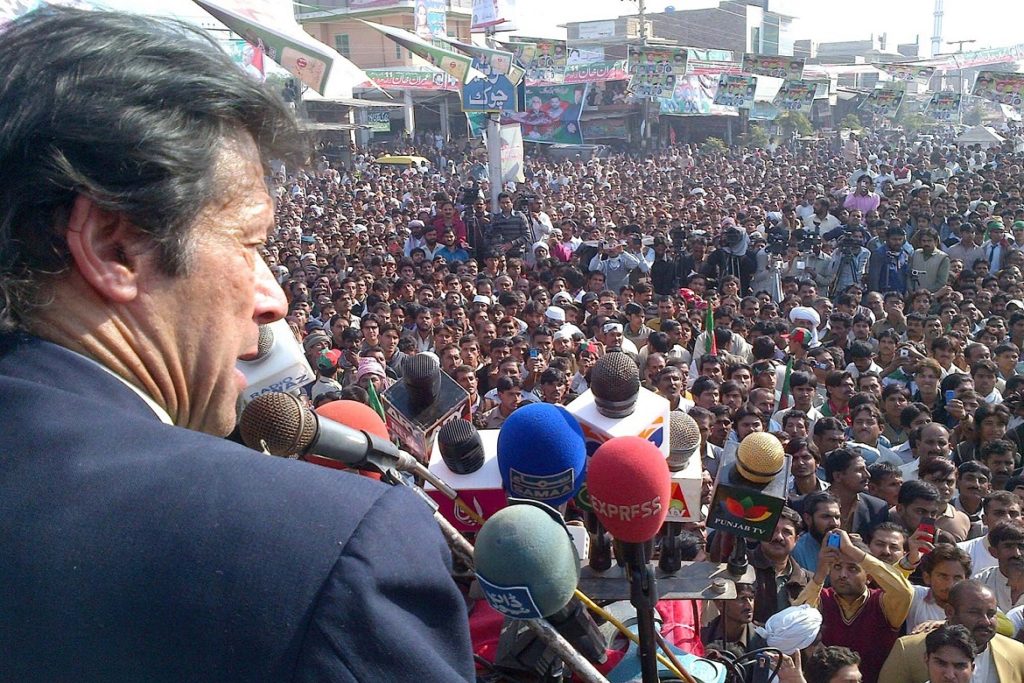Fresh election news trickled a day after the vote on 25th July, from Pakistan confirms the victory of Imran Khan, the chief of Pakistan Tehrik e-Insaf (PTI). The commanding win of 116/272 seats for PTI makes him an obvious choice as the next Pak Prime Minister.
New Delhi is closely watching the entire election with a hawk-eye view, as the post-election advancement can be a make or break situation for the ties between Pakistan and India. India could only hope that the new government in Pakistan make the sinking ship of Indo-Pak relations steady.
The two nuclear armed, sovereign and neighbour nations have by far followed a path of mutual animosity, since their inception. Though they share cultural, geographical, historical and economic links; their relation has been plagued by suspicion and hostility, defined by a violent post-partition period of undivided India, the Kashmir dispute, independence of Bangladesh etc. Both the countries were engaged in hot and cold bilateral relations, being directly involved in war and continuous violation of ceasefire to sharing moments of cordial and warm periods.
However, recurrent terror attacks on Indian soil have fuelled the colder relation and impeded bilateral dialogues between the two countries, since 2013. In this complicated scenario, the charismatic hero of 1992 cricket world cup, Imran Khan is taking the responsibility as PM of Pakistan. The new government will be in immense pressure to fulfil the aspirations of their own people, as well as to accomplish their promises of election manifesto. Nevertheless, the situation will illustrate government’s obligations upon Pakistan’s Army and Intelligence controlling, even altering their decisions.
While the jubilant Imran is preparing to take the oath as the new PM of Pakistan, before their Independence Day, New Delhi has commenced permutations and combinations about the numerous probabilities and scopes on upcoming actions of the new Pak government. So far, Imran Khan’s electoral success has been seen with mixed reactions from India. Indian Prime Minister Narendra Modi congratulated Imran Khan and declared that he was “ready to enter into a new era of relations with Pakistan “showing his diplomatic niceties. However, New Delhi is aware of the influence of Pak Army and right-wing Islamist group upon Khan’s success.
India has shown clear signs to develop the Indo-Pak relation. Raveesh Kumar, Indian Ministry of External Affairs spokesperson welcomed the new Pak government saying that India desires a “prosperous and progressive Pakistan at peace with its neighbours…We hope that the new government will work constructively to build a safe, stable, secure and developed South Asia free of terror and violence.”
On the other side, on his victory speech, Imran Khan has also given a glimmer hope that the Indo-Pak situation can improve stating, “I think it will be very good for all of us if we have good relations with Hindustan (India). We need to have trade ties and the more we engage in trading, the more both nations will benefit.” He asked both countries to conclude the political blame-game, which he believes, is plaguing both the countries solving the Kashmir issue. He appealed both the countries upon discussing the issues with an open mindset. He also reiterated to India “If you take on towards us, we will take two steps towards you. Let’s take the first step at least.”
While, these appear to be a hopeful prospect to tighten the Indo-Pak relation; seasoned politicians are sceptic about things going such smooth way. The primarily wary for New Delhi will be the influence of Pak Army and ISI over the neophyte government of Imran Khan. Khan was accused of being a ‘military puppet’ by several analysts, hence New Delhi must acknowledge that Khan’s decisions will be guided by Pak military’s interests as powerful military will be fixing the pitch of the political game.
Similarly, as PTI has not obtained absolute majority (wining 116 seats of 137 required), so Khan will have to depend upon the allying parties to fix and drive the government’s agenda. And when these parties are under heavy influence of Pak Army, it will be impossible for Khan to bypass the Army in either way. Therefore, India should not be in hallucination about overnight demise of prolonged Indo-Pak dispute, under PM Khan.
Though Khan has shown his interests to improve the Indo-Pak relationship, he advertently skipped many issues while addressing the Indo-Pak relation in his speech. The bone of contention between the two nations- ‘cross-border terrorism’ missed his tongue- it’s not being naive, rather he is fully aware that, addressable of this major issue is obligatory for any rapprochement with India. This is an unambiguous indication of playing safe with Pak Army without stepping out of the crease.
So, whether the next Pak PM, Imran Khan will rise as a hope for India in strengthening the Indo-Pak relation or not remains as a million-dollar question. As of now, a ‘wait and watch’ policy should be obtained by India which will definitely greet any Pak move that fosters the bilateral ties. The rivalry has smashed both the nations in terms of economics, politics and emotions digesting numerous deaths on both sides across the border without any concrete solution. However, India must be conscientious about the limitation of Imran’s power, governed by ‘The Pak Army,’ which has so far strived to maintain its hegemony with India as an existential and ideological threat. Hence, the dilemma may prohibit any advance in bilateral ties, rather India should hope that the captain-turned Prime Minister Imran Khan can overcome internal civil-military tension and proceed further to strengthen the bonding of Pakistan and India.







